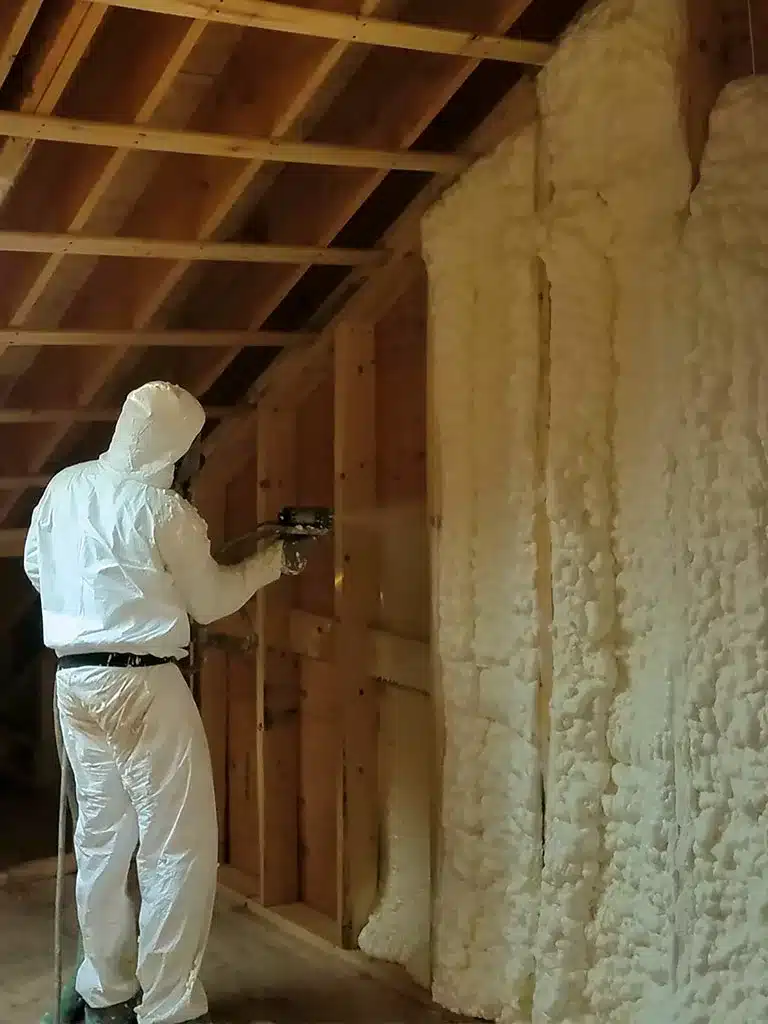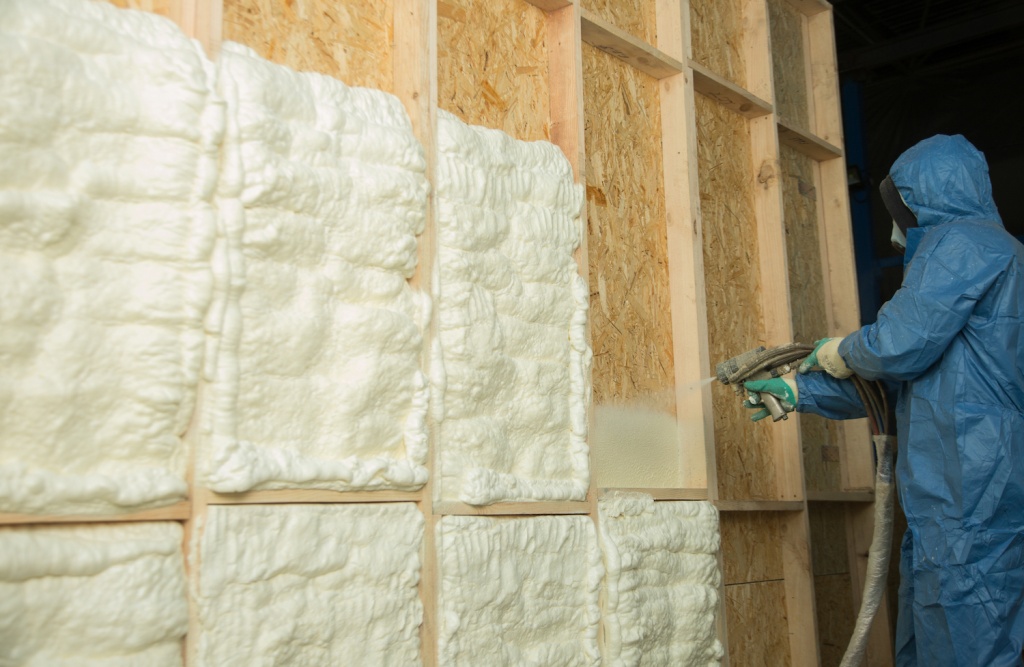Top Applications of Spray Foam for Residential and Commercial Properties
Top Applications of Spray Foam for Residential and Commercial Properties
Blog Article
Spray Foam: The Ultimate Option for Air Sealing and Insulation
Spray foam insulation has arised as a leading remedy for efficient air sealing and thermal insulation, supplying an unique mix of residential properties that establish it apart from traditional methods. Comprehending the full extent of its benefits, setup procedures, and comparisons with various other insulation kinds is crucial for making notified decisions.
What Is Spray Foam?
Spray foam is a flexible insulation product that incorporates the principles of air securing and thermal resistance to boost power performance in structures. Made up mostly of polyurethane or various other similar compounds, spray foam is used as a liquid that increases upon contact with surfaces, creating a strong, continual layer of insulation. This distinct residential property allows it to fill spaces, splits, and spaces that conventional insulation materials might neglect, providing a premium air seal.
There are two main sorts of spray foam: open-cell and closed-cell. Open-cell spray foam is lighter and more versatile, supplying excellent noise absorption and a lower R-value per inch - Spray Foam. In comparison, closed-cell spray foam is denser, supplying a greater R-value, moisture resistance, and included architectural stability to building parts
The application process typically involves customized devices, guaranteeing a smooth application that sticks to various substrates, consisting of concrete, metal, and wood. This versatility makes spray foam appropriate for both brand-new buildings and retrofitting existing structures. Its ability to produce an airtight obstacle considerably adds to minimizing energy usage and enhancing indoor air top quality, thus making it a favored selection amongst builders and house owners alike.
Benefits of Spray Foam Insulation
One of the most considerable advantages of spray foam insulation is its exceptional ability to create a constant air barrier, which properly decreases energy loss. Unlike standard insulation materials, spray foam increases to fill voids and splits, ensuring that air leak is considerably decreased. This particular not only enhances power efficiency yet also leads to lower energy bills with time.
Furthermore, spray foam insulation offers superior thermal resistance, adding to an extra secure interior atmosphere. Its high R-value per inch permits efficient insulation in confined rooms, making it optimal for attic rooms, wall surfaces, and crawl spaces. The moisture-resistant homes of spray foam aid prevent mold and mold development, promoting healthier living conditions.
An additional essential advantage of spray foam insulation is its sound-dampening high qualities (Spray Foam). It effectively reduces noise transmission in between rooms, developing a quieter and a lot more comfortable home setting. The longevity of spray foam additionally attracts attention, as it does not sag or resolve in time, maintaining its efficiency throughout its life-span
Exactly How Spray Foam Works
Recognizing how spray foam insulation functions is essential for valuing its efficiency in air securing and thermal resistance. Spray foam insulation includes two key elements: isocyanate and polyol material. When these components are blended, they undergo a chain reaction that causes the material to increase swiftly, producing a thick foam that fills tooth cavities, gaps, and splits.
As the foam increases, it sticks to surfaces, forming an impermeable seal that considerably decreases air seepage. This particular makes spray foam insulation highly reliable at stopping drafts and wetness infiltration, which can cause energy loss and damage over time. Furthermore, the closed-cell version of spray foam supplies superior thermal resistance due to its stiff structure, effectively reducing heat transfer.
The unique residential or commercial properties of spray foam allow it to comply with uneven surface areas, making sure comprehensive insurance coverage and a seamless barrier. As an outcome, spray foam insulation not just enhances power performance but likewise adds to improved indoor air high quality by minimizing the buildup of toxins and allergens. Eventually, comprehending the technicians behind spray foam highlights its function as a remarkable option for insulation and air securing in both industrial and property applications.
Installation Process Introduction

Prior to setup, the area should be adequately cleaned up and prepped, ensuring that surface areas are devoid of dirt, moisture, and debris. This action is critical since pollutants can compromise bond and overall performance. As soon as the location is prepared, the application involves blending the two elements of the spray foam, which broadens upon contact and loads voids successfully.
Trained professionals must carry out the installation, making use of specialized devices to make certain consistent coverage and optimal density. Safety precautions, including putting on safety equipment and making sure proper air flow, are vital throughout this procedure. After application, the foam generally cures rapidly, developing a strong barrier that improves power useful link performance.
Contrasting Spray Foam to Conventional Insulation
When examining insulation choices, spray foam insulation attracts attention in contrast to standard products such as fiberglass and cellulose. One of the key advantages of spray foam is its exceptional air sealing capacities. Unlike fiberglass and cellulose, which can allow air seepage, spray foam expands upon application, filling voids and crevices to create a closed seal. This leads to boosted energy efficiency, as less warmed or cooled down air runs away the home, bring about reduced energy expenses.
Furthermore, spray foam offers a higher R-value per inch than standard insulation kinds, offering more efficient thermal resistance in a thinner profile. This characteristic is click over here specifically helpful precede with limited tooth cavity depth. Spray foam is resistant to moisture and mold development, which can be a substantial problem with cellulose and fiberglass, particularly in damp environments.
Nevertheless, spray foam insulation generally brings a greater upfront price than its standard counterparts. House owners have to weigh this first financial investment versus long-lasting energy financial savings and performance advantages. Eventually, while both insulation kinds offer their purpose, spray foam arises as an extra sophisticated service for modern insulation demands, particularly in regards to air securing and thermal effectiveness.

Verdict
In recap, spray foam insulation represents a highly effective option for attaining optimum air securing and thermal resistance. Its one-of-a-kind residential or commercial properties, consisting of dampness resistance and noise dampening, make it appropriate for different applications in both brand-new building and constructions and retrofitting tasks (Spray Foam). Although the first expenses might be higher compared to conventional insulation products, the long-term advantages, such as considerable power cost savings and improved interior air quality, validate the investment and highlight its value in modern structure methods.
Spray foam insulation has arised as a leading solution for reliable air securing and thermal insulation, supplying an one-of-a-kind mix of properties that establish it click here to read apart from conventional methods.Spray foam is a versatile insulation material that combines the concepts of air sealing and thermal resistance to boost power performance in structures.When evaluating insulation alternatives, spray foam insulation stands out in comparison to standard materials such as fiberglass and cellulose. Eventually, while both insulation types offer their purpose, spray foam arises as an extra sophisticated solution for contemporary insulation needs, specifically in terms of air sealing and thermal efficiency.
In recap, spray foam insulation represents a very effective option for attaining ideal air securing and thermal resistance.
Report this page